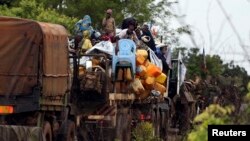JOHANNESBURG, SOUTH AFRICA —
Top U.S. diplomats say the conflicts in South Sudan and the Central African Republic will compound widespread food shortages and and long-term instability. Millions of people in the two countries have been forced to flee their homes because of political, ethnic and sectarian conflict.
U.S. officials are sounding the alarm over what they call humanitarian “catastrophes” in Central African Republic and South Sudan -- neighboring African nations that in the past year have been ripped apart by political turmoil and then descended into bloody conflicts.
The tragedies in the two nations could not be more different. In the Central African Republic, long troubled by civil strife and coups, Muslim rebels toppled the former president last year. In doing so, they unleashed chaos that turned into deadly violence between Muslims and Christians.
South Sudan was supposed to be a success story. In 2011, the people of this landlocked nation voted overwhelmingly to separate from Sudan. Leaders of South Sudan -- many of them former rebel fighters -- ushered in their independence with jubilant, and peaceful, celebrations.
Deteriorating situation
It didn’t last long. In December, the president accused his former deputy of a coup attempt. Their political rift spiraled into armed combat and then degenerated into what the United Nations says is ethnic bloodshed.
Anne Richard, U.S. assistant secretary of state for population, refugees, and migration, described her recent visit to the C.A.R. and to refugee camps in Chad. “Quite frankly, we were shocked by some of the things that we saw. We talked to one gentleman who showed me photos of the mutilated body of his father.”
Her deputy Catherine Wiesner, said the situation in South Sudan is getting worse despite months of intermittent peace talks in Addis Ababa. She said that is why the U.N. Security Council is considering sanctions against some South Sudanese leaders.
“We have been inviting and encouraging and, in fact, I would say pressuring, those politicians to come around the table and have that discussion and that’s really been the focus of our diplomatic engagement ever since December," said Wiesner. "I think it’s because we’ve come to the point where we’ve seen the violence continuing, the attacks on civilians continuing, the blockages to humanitarian assistance continuing, that we have considered this additional to increase the pressure.”
The U.S. government says it has contributed more than $500 million in aid to the two countries since late last year, but humanitarian officials say that money can’t do much if armed groups don’t allow aid workers to access people in need.
U.S. officials are sounding the alarm over what they call humanitarian “catastrophes” in Central African Republic and South Sudan -- neighboring African nations that in the past year have been ripped apart by political turmoil and then descended into bloody conflicts.
The tragedies in the two nations could not be more different. In the Central African Republic, long troubled by civil strife and coups, Muslim rebels toppled the former president last year. In doing so, they unleashed chaos that turned into deadly violence between Muslims and Christians.
South Sudan was supposed to be a success story. In 2011, the people of this landlocked nation voted overwhelmingly to separate from Sudan. Leaders of South Sudan -- many of them former rebel fighters -- ushered in their independence with jubilant, and peaceful, celebrations.
Deteriorating situation
It didn’t last long. In December, the president accused his former deputy of a coup attempt. Their political rift spiraled into armed combat and then degenerated into what the United Nations says is ethnic bloodshed.
Anne Richard, U.S. assistant secretary of state for population, refugees, and migration, described her recent visit to the C.A.R. and to refugee camps in Chad. “Quite frankly, we were shocked by some of the things that we saw. We talked to one gentleman who showed me photos of the mutilated body of his father.”
Her deputy Catherine Wiesner, said the situation in South Sudan is getting worse despite months of intermittent peace talks in Addis Ababa. She said that is why the U.N. Security Council is considering sanctions against some South Sudanese leaders.
“We have been inviting and encouraging and, in fact, I would say pressuring, those politicians to come around the table and have that discussion and that’s really been the focus of our diplomatic engagement ever since December," said Wiesner. "I think it’s because we’ve come to the point where we’ve seen the violence continuing, the attacks on civilians continuing, the blockages to humanitarian assistance continuing, that we have considered this additional to increase the pressure.”
The U.S. government says it has contributed more than $500 million in aid to the two countries since late last year, but humanitarian officials say that money can’t do much if armed groups don’t allow aid workers to access people in need.




